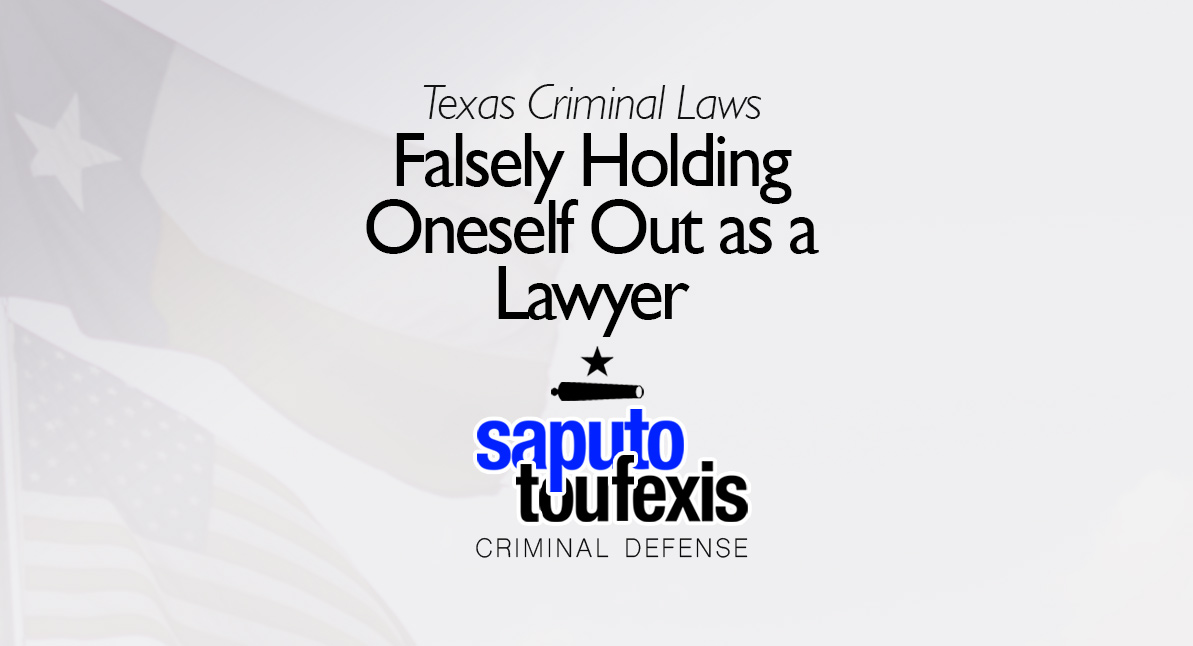The Texas Falsely Holding Oneself Out as a Lawyer law makes it a crime to pretend to be a lawyer if you do so with the intent to make money or obtain another economic benefit.
FAQs about the
Falsely Holding Oneself Out as a Lawyer law in Texas
- What is the current Texas law about Falsely Holding Oneself Out as a Lawyer?
- What is the penalty for a Texas Falsely Holding Oneself Out as a Lawyer offense?
- How can I be charged with a Falsely Holding Oneself Out as a Lawyer offense in Texas?
- What is the statute of limitations for Falsely Holding Oneself Out as a Lawyer in Texas?
- Can you get probation for Falsely Holding Oneself Out as a Lawyer in Texas?
- What level of crime is Falsely Holding Oneself Out as a Lawyer in Texas?
The Texas legislature codified this criminal offense in Texas Penal Code Section 38.122. The legislature did not update this law in 2025. In fact, this law has not been amended since 1993.
The Penal Code classifies the Texas Falsely Holding Oneself Out as a Lawyer law under Title 8 “Offenses Against Public Administration,” Chapter 38 “Obstructing Governmental Operation.” Learn more about the Texas offense of Falsely Holding Oneself Out as a Lawyer below.
What is the current Texas law about Falsely Holding Oneself Out as a Lawyer?
AV Preeminent Texas lawyer Paul Saputo provides the current law defining Falsely Holding Oneself Out as a Lawyer in Penal Code Section §38.122, as follows:[1]
(a) A person commits an offense if, with intent to obtain an economic benefit for himself or herself, the person holds himself or herself out as a lawyer, unless he or she is currently licensed to practice law in this state, another state, or a foreign country and is in good standing with the State Bar of Texas and the state bar or licensing authority of any and all other states and foreign countries where licensed.
What is the penalty for a Texas Falsely Holding Oneself Out as a Lawyer offense?
A conviction for Falsely Holding Oneself Out as a Lawyer in Texas is punished as a Third Degree Felony,[2] with a maximum possible fine under Texas state law of up to $10,000 and prison time of up to 10 years.
How can I be charged with a Falsely Holding Oneself Out as a Lawyer offense in Texas?
You can be charged with Falsely Holding Oneself Out as a Lawyer in Texas if the state’s attorneys believe that each of the elements of §38.122(a) as described in the section above have been met.
What is the statute of limitations for Falsely Holding Oneself Out as a Lawyer in Texas?
Falsely Holding Oneself Out as a Lawyer offenses have a three-year limitations period.[3]
Can you get probation for Falsely Holding Oneself Out as a Lawyer in Texas?
The Texas Code of Criminal Procedure allows both judges and juries to grant probation for Falsely Holding Oneself Out as a Lawyer, and judges are also allowed to accept deferred adjudication plea deals.[4]
What level of crime is Falsely Holding Oneself Out as a Lawyer in Texas?
The Penal Code classifies Falsely Holding Oneself Out as a Lawyer as a third degree felony.
Learn more about the penalty range for this offense in the section above.
Legal References:
^1. Texas Penal Code §38.122. This law is current as of 2025.^2. Texas Penal Code Section 38.122(b)^3. See Code of Criminal Procedure §12.01(11)^4. See Chapter 42A, Texas Code of Criminal Procedure, Art. 42A.054, Art. 42A.056, Art. 42A.102










